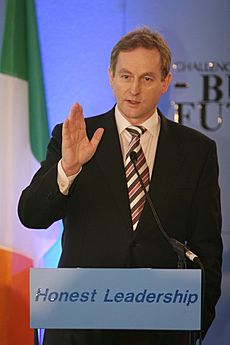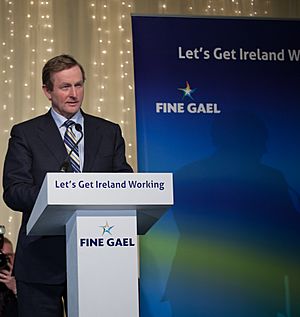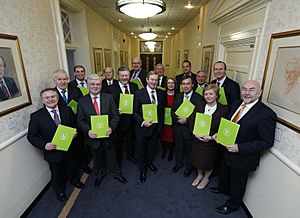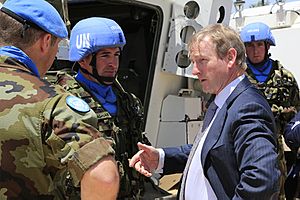Enda Kenny facts for kids
Quick facts for kids
Enda Kenny
|
|||||||||||||||||||||||||||||||||||||||||
|---|---|---|---|---|---|---|---|---|---|---|---|---|---|---|---|---|---|---|---|---|---|---|---|---|---|---|---|---|---|---|---|---|---|---|---|---|---|---|---|---|---|
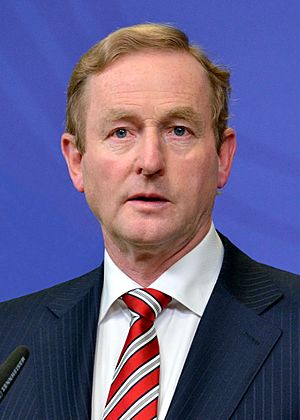
Kenny in 2012
|
|||||||||||||||||||||||||||||||||||||||||
| Taoiseach | |||||||||||||||||||||||||||||||||||||||||
| In office 9 March 2011 – 14 June 2017 |
|||||||||||||||||||||||||||||||||||||||||
| President | |||||||||||||||||||||||||||||||||||||||||
| Tánaiste | |||||||||||||||||||||||||||||||||||||||||
| Preceded by | Brian Cowen | ||||||||||||||||||||||||||||||||||||||||
| Succeeded by | Leo Varadkar | ||||||||||||||||||||||||||||||||||||||||
|
|||||||||||||||||||||||||||||||||||||||||
| Leader of Fine Gael | |||||||||||||||||||||||||||||||||||||||||
| In office 5 June 2002 – 2 June 2017 |
|||||||||||||||||||||||||||||||||||||||||
| Deputy |
|
||||||||||||||||||||||||||||||||||||||||
| Preceded by | Michael Noonan | ||||||||||||||||||||||||||||||||||||||||
| Succeeded by | Leo Varadkar | ||||||||||||||||||||||||||||||||||||||||
| Leader of the Opposition | |||||||||||||||||||||||||||||||||||||||||
| In office 5 June 2002 – 9 March 2011 |
|||||||||||||||||||||||||||||||||||||||||
| President | Mary McAleese | ||||||||||||||||||||||||||||||||||||||||
| Taoiseach |
|
||||||||||||||||||||||||||||||||||||||||
| Preceded by | Michael Noonan | ||||||||||||||||||||||||||||||||||||||||
| Succeeded by | Micheál Martin | ||||||||||||||||||||||||||||||||||||||||
| Teachta Dála | |||||||||||||||||||||||||||||||||||||||||
| In office June 1997 – February 2020 |
|||||||||||||||||||||||||||||||||||||||||
| Constituency | Mayo | ||||||||||||||||||||||||||||||||||||||||
| In office November 1975 – June 1997 |
|||||||||||||||||||||||||||||||||||||||||
| Constituency | Mayo West | ||||||||||||||||||||||||||||||||||||||||
| Personal details | |||||||||||||||||||||||||||||||||||||||||
| Born | 24 April 1951 Castlebar, County Mayo, Ireland |
||||||||||||||||||||||||||||||||||||||||
| Political party | Fine Gael | ||||||||||||||||||||||||||||||||||||||||
| Spouse |
Fionnuala O'Kelly
(m. 1992) |
||||||||||||||||||||||||||||||||||||||||
| Children | 3 | ||||||||||||||||||||||||||||||||||||||||
| Parent | Henry Kenny (father) | ||||||||||||||||||||||||||||||||||||||||
| Education | St Gerald's College, Castlebar | ||||||||||||||||||||||||||||||||||||||||
| Alma mater |
|
||||||||||||||||||||||||||||||||||||||||
| Signature |  |
||||||||||||||||||||||||||||||||||||||||
Enda Kenny, born on April 24, 1951, is an Irish politician who used to be the leader of the Fine Gael party. He served as Taoiseach (which is like the Prime Minister of Ireland) from 2011 to 2017. He was also the leader of Fine Gael from 2002 to 2017. Before becoming Taoiseach, he held several important roles, including Minister for Tourism and Trade and Leader of the Opposition. He was a Teachta Dála (TD), a member of the Irish Parliament, for Mayo West and then Mayo from 1975 until 2020.
Kenny led Fine Gael to a big win in the 2011 general election. His party became the largest in Ireland for the first time ever. They formed a government with the Labour Party. He was the first Fine Gael Taoiseach to be elected for a second time in a row in 2016. He became the longest-serving Fine Gael Taoiseach in April 2017. Kenny stepped down as leader of Fine Gael in June 2017 and then resigned as Taoiseach. Leo Varadkar took over from him.
Early Life and First Steps in Politics
Enda Kenny was born in 1951 in a place called Derrycoosh, near Castlebar, County Mayo. He was the third of five children. He went to local schools and then studied at St Patrick's College, Dublin and University College Galway. He worked as a primary school teacher for four years. He also played football for his local club, Islandeady GAA.
Joining the Dáil (1975–1994)
Enda Kenny grew up around politics because his father, Henry Kenny, was also a Fine Gael TD. In 1975, when his father passed away, Enda was chosen to run in the special election that followed. He won easily and became the youngest member of the 20th Dáil at just 24 years old.
For nearly ten years, Kenny worked hard for his local area. He was a spokesperson for Youth Affairs and Sport, and then for Western Development. In 1986, he became a Minister of State for Youth Affairs in the Department of Education and Labour. After the 1987 election, Fine Gael was in opposition for seven years. During this time, Kenny's national profile grew as he held various roles in the party's leadership team.
Minister for Tourism and Trade (1994–1997)
In 1994, a new government called the "Rainbow Coalition" was formed. Enda Kenny played a key role in making this happen. He became the Minister for Tourism and Trade. During his time as minister, tourism in Ireland grew a lot, and Ireland's international trade also improved. He helped bring a stage of the 1998 Tour de France to Ireland. In 1997, his party lost the general election, and he returned to the opposition.
Leading the Opposition (2002–2011)
After a difficult election for Fine Gael in 2002, where they lost many seats, Enda Kenny became the leader of the party. He worked to rebuild Fine Gael.
Growing Support for Fine Gael
Under Kenny's leadership, Fine Gael did better than expected in the 2004 local and European elections. This was the first time Fine Gael had ever beaten Fianna Fáil in a national election. This showed that the party was gaining more support.
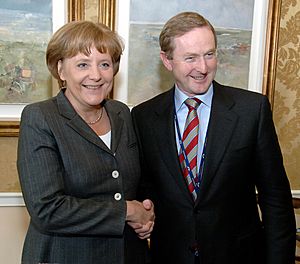
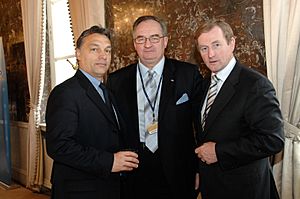
In 2006, Kenny was elected vice-president of the European People's Party (EPP), which is a large group of political parties in Europe. This helped him build important connections across Europe.
For the 2007 general election, Fine Gael and the Labour Party agreed to work together to form a government. Kenny presented his plan for Ireland, focusing on improving healthcare, increasing police numbers, and making jail sentences tougher. While Fine Gael gained many seats, they didn't get enough to form a government, and Fianna Fáil remained in power.
Leadership Challenge and Rebuilding
In 2010, some members of Fine Gael questioned Kenny's leadership. However, he won a vote of confidence and remained the party leader. He then made changes to his team, bringing back some of those who had challenged him.
The 2011 General Election
During the 2011 general election campaign, Enda Kenny promised that Fine Gael would not increase income tax if they were in government. He also said that Ireland needed a strong government, not one that relied on independent politicians. He took part in several TV debates with other party leaders.
On February 14, 2011, Kenny met with German Chancellor Angela Merkel to discuss the Irish economy. They had a close relationship because their parties were both part of the European People's Party.
In the election, Fine Gael won a huge victory, getting 76 seats. This was the most seats the party had ever won, and they became the largest party in the Dáil for the first time. Kenny himself received the most votes in his Mayo area. Fine Gael and the Labour Party formed a coalition government, with Enda Kenny becoming Taoiseach and Labour leader Eamon Gilmore becoming Tánaiste. Kenny said his first goal was to change the terms of Ireland's financial bailout.
Taoiseach (2011–2017)
Enda Kenny became Taoiseach on March 9, 2011. He was nominated by the Dáil with a large majority. He then appointed his government ministers.
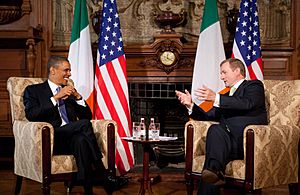
Early Actions and Financial Policy
One of Kenny's first actions as Taoiseach was to cut his own pay by 7%. His government also cut the pay of other senior ministers. They also reduced the money spent on transporting ministers.
At his first European Council meeting, Kenny stood firm against pressure to change Ireland's low corporate tax rate. However, when Irish banks needed more money, his government decided to provide it, which drew some criticism. Despite this, public support for his party remained high. His government also introduced rules to limit banker salaries and bonuses. In July 2011, Kenny announced that European leaders had agreed to lower Ireland's interest rate on its bailout loan.
Political Changes
In May 2011, Kenny's government approved several political reforms. These included plans to reduce the number of TDs (members of parliament) and to hold a referendum on getting rid of the Seanad (the upper house of parliament).
Addressing the Nation
Kenny gave a televised speech to the nation in December 2011, before the 2012 Irish budget. He warned that the budget would be "tough" but necessary to help Ireland's economy recover. This was only the sixth time a Taoiseach had addressed the nation in this way, showing how serious the economic situation was.
International Recognition
In October 2012, Enda Kenny was featured on the cover of Time magazine, which praised his leadership. In November 2012, he won the "Golden Victoria European of the Year 2012" award for his work in Europe. In December 2012, he was one of 20 EU leaders who accepted the Nobel Peace Prize on behalf of the European Union.
Leading the European Council (2013)
For the first six months of 2013, Ireland held the Presidency of the Council of the European Union. This meant Ireland chaired important EU meetings and helped set the agenda. Kenny promised that Ireland's presidency would bring "new hope" during the economic crisis. Under his leadership, a deal was reached on the EU's large budget.
Exiting the Bailout
In February 2013, Kenny's government reached a deal with the European Central Bank regarding the bailout of Anglo Irish Bank. He called it "a good day for the country."
In December 2013, Ireland became the first country to successfully leave its bailout program from international lenders. This was a big step for Ireland, showing that its economy was recovering. Kenny was praised by leaders like German Chancellor Angela Merkel for his efforts. This meant Ireland regained control of its own economy. To mark this, Kenny gave another national address, saying the country was moving in the right direction.
Later Years as Taoiseach
In 2014, there were some changes in government, including the resignation of the Minister for Justice. In 2015, Kenny continued to lead the country through economic recovery.
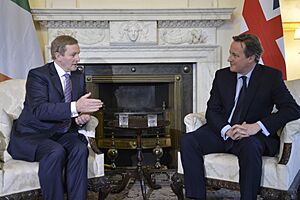
In February 2016, Kenny called a general election. Fine Gael won 50 seats, but not enough for a majority. After some negotiations, Kenny was re-elected Taoiseach in May 2016, leading a minority government. He was the first Fine Gael leader to be re-elected Taoiseach.
Regarding Brexit, Kenny said that Britain leaving the European Union would cause "serious difficulty" for peace in Northern Ireland. He supported Britain staying in the EU.
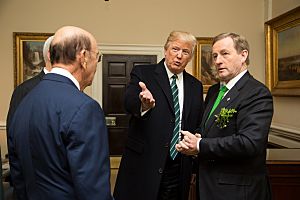
In March 2017, Kenny met with US President Donald Trump for the traditional St. Patrick's Day celebrations. His speech on the importance of immigration went viral and was widely praised. He spoke about how Saint Patrick was an immigrant and how America had welcomed immigrants from Ireland.
During the Brexit talks in 2017, Enda Kenny insisted on including a clause about a united Ireland. This clause stated that if a future vote for Irish unity happened, Northern Ireland would automatically rejoin the European Union. This was seen as a major achievement for Kenny.
Kenny also played a key role in making the world's largest sports air dome, located near Knock, County Mayo, a reality. He suggested the idea, and it became a cost-effective and versatile facility for sports and other events.
Retirement from Taoiseach Role
On May 17, 2017, Enda Kenny announced he would step down as leader of Fine Gael. Leo Varadkar was chosen as his successor. Kenny officially resigned as Taoiseach on June 13, 2017. The next day, he nominated Varadkar to take his place. In his farewell speech to the Dáil, Kenny quoted Theodore Roosevelt, saying, "Far and away, the best prize that life has to offer is a chance to work hard at work worth doing."
After Being Taoiseach (2017–2020)
After stepping down as Taoiseach, Enda Kenny continued to serve as a TD until 2020. In June 2018, he was named 'Irish European of the Year' for his work in promoting Ireland's place in Europe during challenging times. In December 2017, he received the 'TK Whitaker Award for Outstanding Contribution to Public Life'.
Post-Political Activities
In 2021, Enda Kenny presented a six-part Irish language TV series called Iarnród Enda about old Irish railway routes. He donated his salary from the show to a hospice charity. He also joined the boards of several companies, including a private equity firm and a public relations agency.
Enda Kenny's Impact
Enda Kenny had a big impact on his Fine Gael party. He was the only person in modern Irish politics to take over a major party from outside its main leadership. When he became leader in 2002, Fine Gael had only 31 seats. Under his leadership, the party grew in every election he fought, winning 76 seats in 2011. This made Fine Gael the largest party in the Dáil for the first time in its history.
Kenny's time as Taoiseach was mostly focused on dealing with the economic crisis. His government helped Ireland regain its financial independence after one of the worst economic times in Irish history. When he became Taoiseach in 2011, the unemployment rate was very high, but by the time he left office in 2017, it had dropped significantly. Also, fewer people were leaving Ireland to find work.
Kenny also cut his own salary and made other cost-saving changes in government. He had promised to make Ireland the best small country in the world for business, and by the end of his time as Taoiseach, Ireland's economy was growing faster than any other in Europe.
His insistence on including the united Ireland clause in the Brexit negotiations is seen as a very important achievement that could have a lasting impact on Ireland. Enda Kenny became the longest-serving Fine Gael Taoiseach.
Personal Life
Enda Kenny married Fionnuala O'Kelly in 1992. She worked as a press officer for another political party and later for RTÉ, Ireland's national broadcaster. They have three children: a daughter named Aoibhinn and two sons, Ferdia and Naoise.
Kenny enjoys outdoor activities. He has climbed Mount Kilimanjaro and completed the Ring of Kerry Charity Cycle. He is a big fan of his home county's Mayo GAA football team and played for his local club, Islandeady GAA, where he is now the club president. His father, Henry, won an All-Ireland medal in Gaelic football in 1936.
In February 2023, it was announced that Kenny had been diagnosed with cancer. He had a medical procedure and was expected to make a full recovery.
See also
 In Spanish: Enda Kenny para niños
In Spanish: Enda Kenny para niños
- Families in the Oireachtas
 | Lonnie Johnson |
 | Granville Woods |
 | Lewis Howard Latimer |
 | James West |


